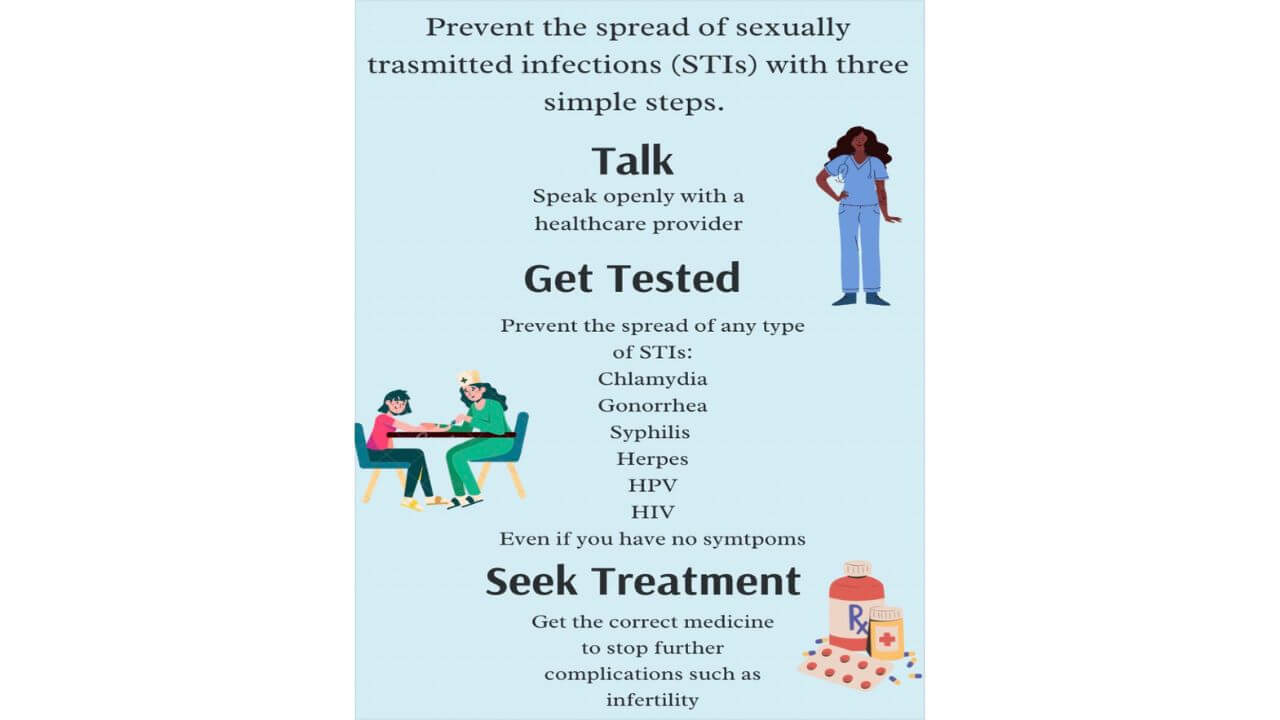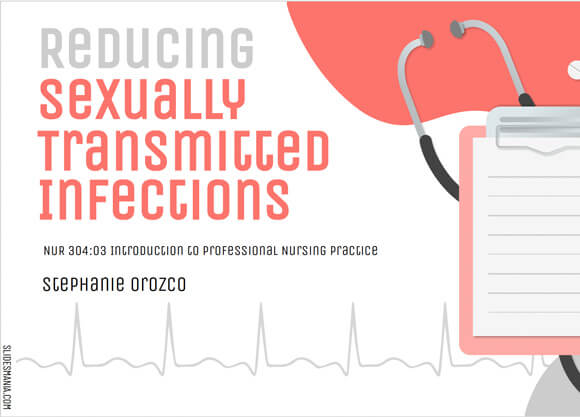
Accelerated Nursing
Reducing Sexually Transmitted Infections

Accelerated Nursing
Reducing Sexually Transmitted Infections
Stephanie Orozco ’24 focused this project on how to reduce sexually transmitted infections and how that can do done through promotion on social media. It was developed as a part of NUR 304: Introduction to Professional Nursing Practice.
Course Overview
In this course, nursing students are introduced to the role of the nurse (including historical, ethical, political, social and legal aspects of nursing), nursing theory, health promotion through the lifespan and diversity and inclusion.
Author

Stephanie Orozco '24
Nursing
School of Nursing
Reducing Sexually Transmitted Infections
Healthy People 2030
-
Every year, 20 million new STI cases are reported, with young individuals and men who have sex with men to be at most risk.
-
There is no indication that this trend will stop anytime soon.
-
-
Many untreated STIs can cause STDs.
-
The goal is to reduce sexually transmitted infections and their complications and improving access to STI care.
Future of Nursing Report
This report demonstrates that nurses can focus on improving the health needs of society and achieving health equity for all individuals.
Nurses would be able to provide equal and accessible healthcare to all individuals who seek to get tested or treated for STIs, regardless of their race, ethnicity, sexual orientation, gender identity, disability or socioeconomic status.
Role of The Professional Nurse
-
Educate patients on STIs and how to prevent them
-
Using protection
-
Limiting multiple sex partners
-
Limiting the use of drugs and alcohol
-
-
Gathering sexual history and recommending screening for all types of STIs even if the patient does not have any symptoms to prevent complications.
-
Provide treatment and vaccination for STI prevention.
-
Make patients feel comfortable and assure them that everything being discussed is confidential.
Imogene King’s Theory of Goal Attainment
Nursing is built on human interactions between the nurses and patients, which allow them to communicate and be able to create goals and agree to achieve them.
Nurses can start by explaining to their patients how the most common STIs, such as HIV, HPV, and syphilis, can lead to death if not treated immediately. The nurse and the patient can work together to establish goals such as encouraging safe sex, following up and being tested every 3 to 6 months or once a year, completing any course of treatment, and getting retested to see if the patient is negative before engaging in sexual activity.
Ethical and Legal Considerations
Ethical Considerations
-
Autonomy: When it comes to patient care, the patient's wishes must be respected. If a patient disagrees with any form of STI treatment or testing, they could decide to discontinue it.
-
Beneficence: When deciding what type of STI screening and treatment to do, the patient's best interests must be considered.
Legal Considerations
-
Patient Consent: Patient consent must be obtained before starting any STI treatment or testing.
-
Confidentiality: Every patient's STI results and procedures performed are kept private. The patients sex history is also kept private.
Role of Social Media
-
Promoting STI testing and treatment will limit the spread of STIs and eliminate the stigma associated with them.
-
Patient information cannot be advertised online.
Holism
Holistic nursing is about treating the body, mind, and spirit.
-
The mind and body are connected, and one's emotional and mental well-being may impact the physical body.
-
When a patient is tested or treated for a STI, they may feel ashamed, anxious, or fearful of being rejected by society if they were to be positive for infections like HIV. This has an impact on their psychological health, and their body reacts to it.
-
When a patient is concerned and stressed while waiting for test results, they can be instructed to engage in relaxation exercises to care for their mental wellbeing.
-
-
The patient's overall wellness is important, and when they experience problems both mentally and physically, they will need someone to support them.
Social Determinants of Health
-
Racial and Ethnic Disparities: Individuals from minority groups are more likely to face discrimination from health care professionals, which makes them reluctant to get tested and treated for STIs.
-
Education: Individuals without access to higher education are unable to learn about sexual health education and the harm that STIs can cause if not prevented, such as the development of cancer.
-
Healthcare Access and Quality: Individuals who do not have access to healthcare services do not have a primary care practitioner who will provide preventive care to ensure that STIs do not develop into STDs.
-
Employment and Working Conditions: Individuals who are not employed find it difficult to obtain insurance. This will require them to be unable to access or afford high-quality care, forcing them to pay out of pocket for testing and treatment, which might be pricey.
Cultural Humility
-
Be aware that everyone comes from different backgrounds.
-
Understand that every patient will have unique views, biases, and values.
-
-
Recognize and learn about the various cultures of the patients being treated.
-
Understand that patients may have distinct views about healthcare, and an alternative healthcare plan might have to be requested.
-
-
Understand that several languages are spoken and that one must be able to communicate successfully with patients.
-
Be able to communicate with patients by overcoming language barriers and making them feel comfortable.
-
The Role of Nurse in Achieving Health Equity
-
Advocating for public policy change
-
Focusing on communities who are at greater risk of becoming infected including minority groups, adolescents, young adults and men who have sex with men.
-
-
Partner and work with community health workers to provide affordable and accessible care.
-
Referring patients to low cost and free clinics that perform STI screening and provide STI treatment.
-
-
Recognize and comprehend the diverse communities that are being served.
-
Providing language interpreters for individuals with language barriers and assuring that all individuals seeking treatment are safe and respected no matter race, ethnicity, sexual orientation, and cultural beliefs.
-
Health Promotion and Education
-
Advise patients to use condoms and get vaccinated for Hepatitis B and HPV.
-
Let patients know the various type of STIs that exist and if they are not treated it can lead to STDs:
-
Pelvic Inflammatory disease caused by chlamydia and gonorrhea
-
AIDS caused by HIV
-
-
Inform patients that when an STI goes untreated it can lead to long term effects:
-
Syphilis can cause blindness
-
Chlamydia and gonorrhea can cause infertility
-
HPV can cause cervical cancer
-
-
Inform them that an STI can remain dormant as they may not show any symptoms.
-
Encourage frequent STI screening, and if an individual is infected, they and their partners should seek treatment to stop the spread.
-
STI testing can be promoted through various forms:
-
Social media: Creating social media accounts to share information about STIs and build a community where people may ask questions and receive private answers.
-
Telehealth: Offer free consultation visits to anyone who wants to learn more about STIs and answer any questions regarding the testing and treatment process.
-
Education: Go to schools and engage with students by raising awareness concerning STIs.
-
Community: Distribute STI-related posters to various community boards, such as churches, public parks, and neighborhood shops.
-
Why Social Media?
Majority of people in society use at least one type of social media platform ranging from young individuals to adults.
-
Using social media is a great method to raise awareness of the importance of STI screenings.
-
It will reduce the negative stigma associated with obtaining STI medical care.
-
People can become aware of the various forms of STIs and the harmful consequences that they cause.
The social media post that will be used is a post that will be uploaded on Instagram, Facebook, and Snapchat stories. In order for this post to be successful it has to explain STIs and the importance it has on one's health.
Social Media Post
For further discussion
This serves is an overview of the project and does not include the complete work. To access the full project and discuss the work, please email Stephanie Orozco.
Explore the Nursing Area of Interest
We've sorted each of our undergraduate, graduate and doctoral programs into unique Areas of Interest. Explore these categories to discover which programs and delivery methods best align with your educational and career goals.
